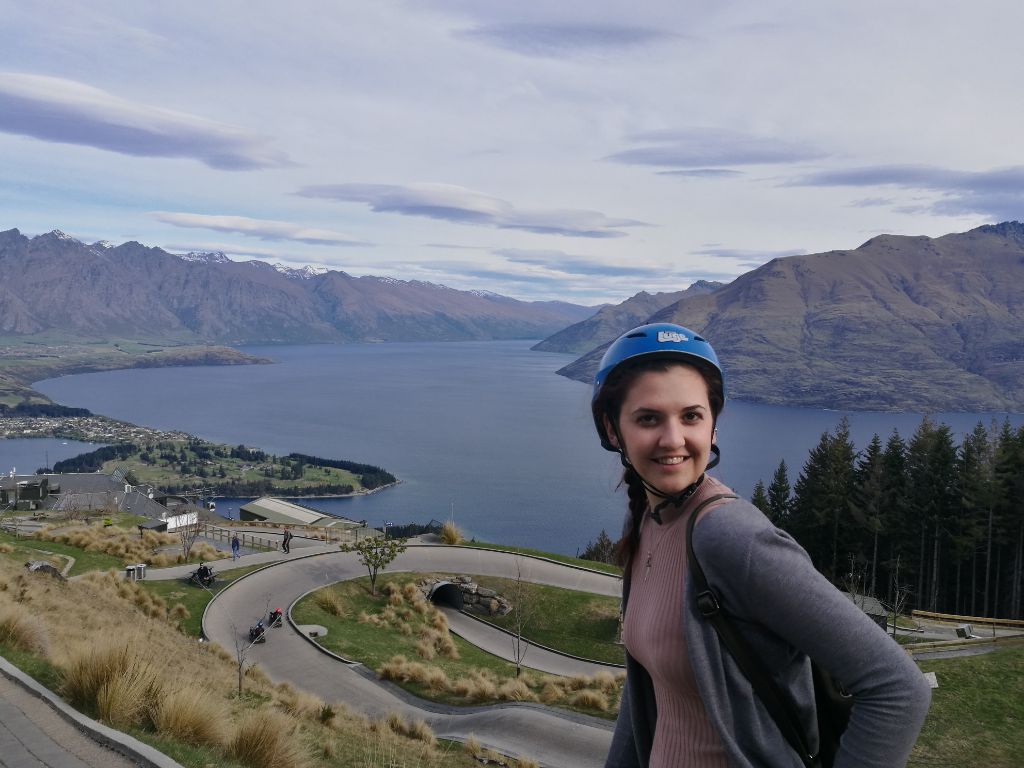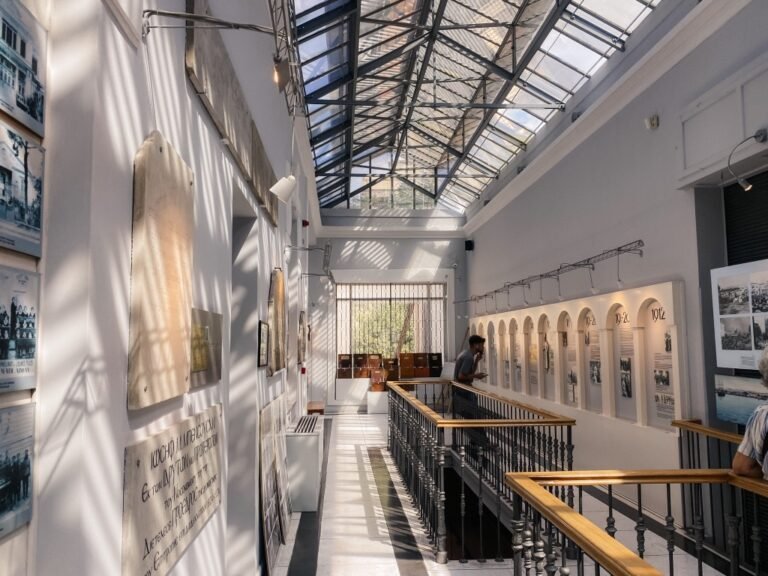This article may contain affiliate links. When you purchase something we recommend, we make a small commission. You don’t pay anything extra. 💘 For more details, check out our Terms of Use page.
Forgive me for starting with the obvious, but New Zealand is one of the best countries you could choose for solo travel.
I called New Zealand home for 7 years, before moving to Europe and in that time, planned a lot of solo road trips and hiking trips, including a 1+ month long solo road trip.
Whether you are already in New Zealand, have lived there all your life, or are visiting from overseas, you have chosen to explore as much of this stunning country as possible. The purpose of this guide is to help you plan your solo road trip across the country with ease.
Let’s get started!
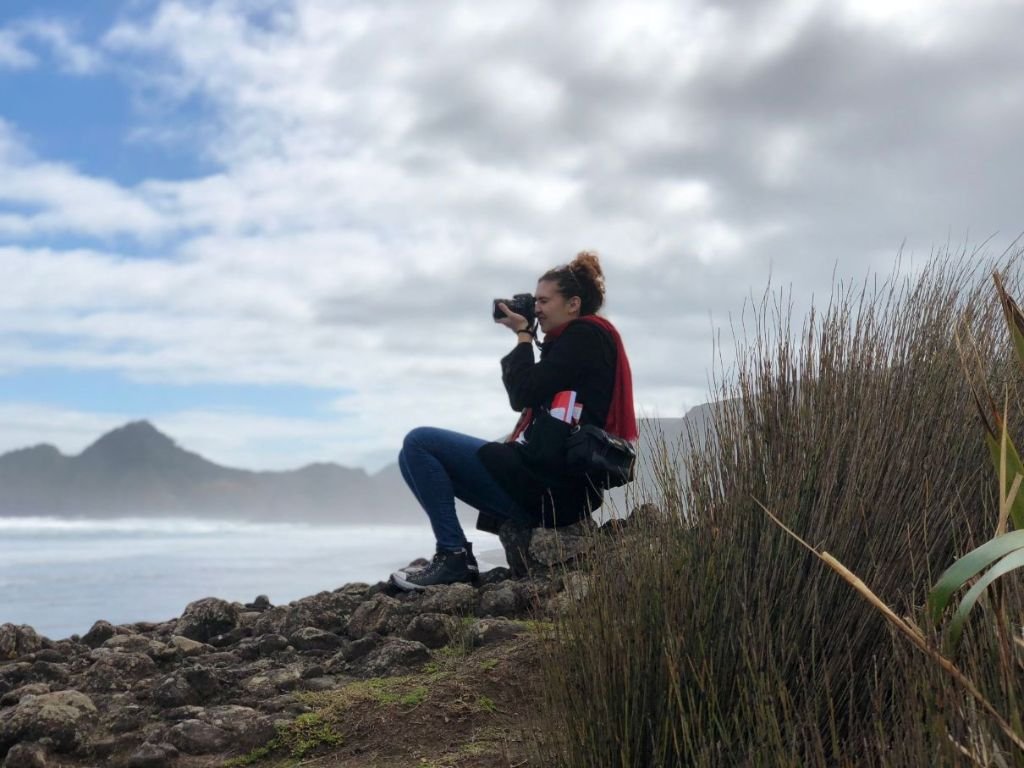
Table of Contents
ToggleBest Time to Visit New Zealand for a Solo Road Trip
The summer season in New Zealand is December – February.
It is the best time for outdoor activities and camping. That said, don’t expect melting hot temperatures, especially if you are heading towards the South Island.
New Zealand summer at night is more like a pleasant spring day which means you will want to pack warm gear, especially if you are camping or hiking.
The autumn season between March and May is great, with fewer crowds and colorful landscapes, but might pose issues for weather, if you are planning a lot of hiking.
The winter months will be great for a South Island road trip, focused on skiing or exploring the cities.
And of course spring, November to September, is another great season for hiking and blooming flowers.
What to pack for a solo road trip in New Zealand
- Essential Gear: tent, sleeping bag, portable stove, flashlight, power bank
- Clothing: layers, good waterproof shell and jacket, fleece, comfortable hiking shoes
- Documentation: driver’s license, car insurance, camping permits.
- Emergency Kit: first aid, extra food and water, emergency blanket.
My New Zealand road trip experience
I took my first solo trip in New Zealand when I was 18 and wanted to escape work for a few weeks and explore the country.
With little money and my desire for unconventional travel experiences, I signed up for WWOOFing and volunteer in organic farms for a few months. After that, I was hooked.
My master trip that has inspired this article came a few years later when I decided to drive from Auckland in the north where I was living, to the bottom of the South Island, while doing some long day hikes and camping at the same time.
If you want to have your solo road trip adventure around New Zealand, these are my tips and recommendations. Also, check out this article on the most important things I’ve learned from travelling solo around New Zealand.
How to plan a New Zealand roadtrip
Start with research
Are you excited, because get excited! Seriously, if the researching and planning stages of a trip don’t make you jump up and down in anticipation you are missing out on one of the best parts of a trip.
New Zealand has some world-renowned magical destinations that people travel thousands of hundreds of miles to see. And you will get to visit them and take it all in.
If you have never been to New Zealand before, start with the basics. You would be surprised at how many people think New Zealand is part of Australia for example.
For the planning and research stage, I would open up Google Maps and some of my favourite blogs or travel magazines and start looking at what is on offer.
Another great option for inspiration and information is the Campermate app.
Every single traveller I have met in New Zealand has this app and with 1.5 million downloads, that might as well be true. Campermate is especially useful if you will be camping or driving a self-contained vehicle like a campervan but it also provides a ton of information to travellers in general.
Keep your budget in mind
Every trip requires a budget.
While having to keep track of finances seems annoying at the start, a budget is actually about freedom and flexibility. When you know how much money you have and how to plan accordingly, you can explore the places that truly matter to you and focus on the experiences you consider unmissable.
The flipside to that is setting out with no clear budget and realizing you are practically broke and can’t afford your lifetime dream of Skydiving in Queenstown.
For a practical and reasonable budget, you should (before you start booking anything) decide on:
- the length of the road trip
- the car situation (your own/rental/relocation camper)
- the type of accommodation you will use
- the gear you will need with you
- the activities you want (what is the most expensive thing you want to do?)
- the places that you HAVE to visit
- will you cook your food/ or buy meals?
In my case, I wanted my budget for my one-month-long solo road trip in New Zealand to be equal to or less than my monthly spending if I was staying at home. That meant my daily allowance was less than $60 NZ ($40 USD) a day. That includes gas, accommodation, food, and activities and is 100% doable.
Since I was moving house at the time and did not have to pay rent at the same time., I was easily able to achieve this. If you are travelling to New Zealand and are not renting, this is something you can do as well, quite easily.
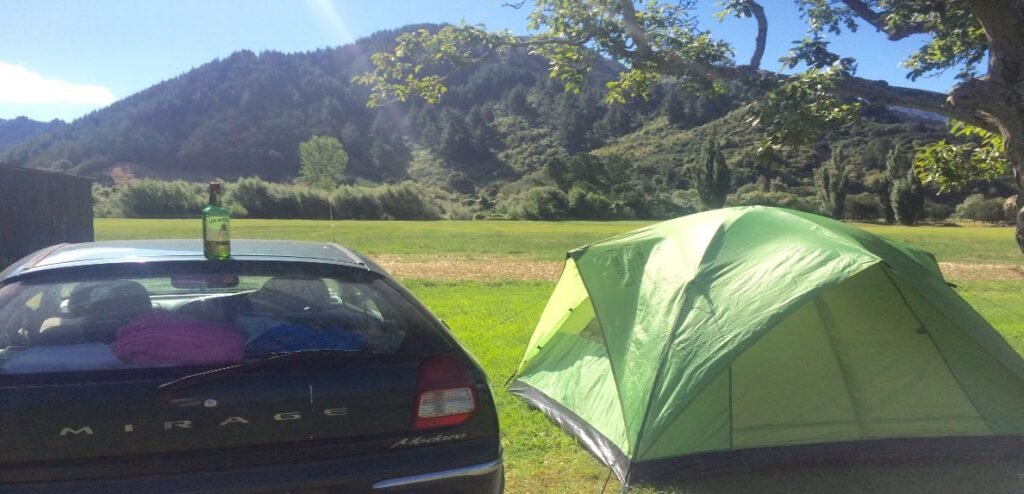
Pick your transport
This is a road trip so obviously you are driving!
Will you need to buy a car or is it best to find a relocating camper van deal and drive it from point A to B?
There is no denying that having your own car offers a degree of flexibility that you will not get with a camper van rental. It is also a much more affordable option, especially since you are travelling solo and are not spending the cost with anyone else.
Auckland is the most popular place for overseas travellers that have just arrived in the country to purchase a road trip car. Because New Zealand attracts a steady flow of young visitors looking to road trip across the country, it is easy to find cars that have been converted into campers, from travellers that are now leaving the country and have no use for all the equipment.
You can find campervans and equipped cars in backpacker boards for as little as 2000 NZ but a more reasonable price is 3-5k together plus cooking and sleeping gear and small camping furniture like chairs and a table.
If you are renting a car or need to purchase gear for your road trip then add those to the budget as well.
If you are not buying a car, then you are probably best renting a cheap car or van. For a day 10-day roadtrip, you will be able to find something starting from $100 including a toilet, and insurance.
Here are some companies that offer long term van rentals in New Zealand at the moment:
A much cheaper alternative, is to rent a normal car and use campsite as accommodation. This will save you more on camp fees, petrol, rental fees and is often a better short term option for a solo road trip.
For car rentals, I use and recommend Discover Cars, for how easy it is to compare across different providers.
A 21-day car rental for Christmas 2024-2025, starts at $750 or about $30 per day, which is a great price!
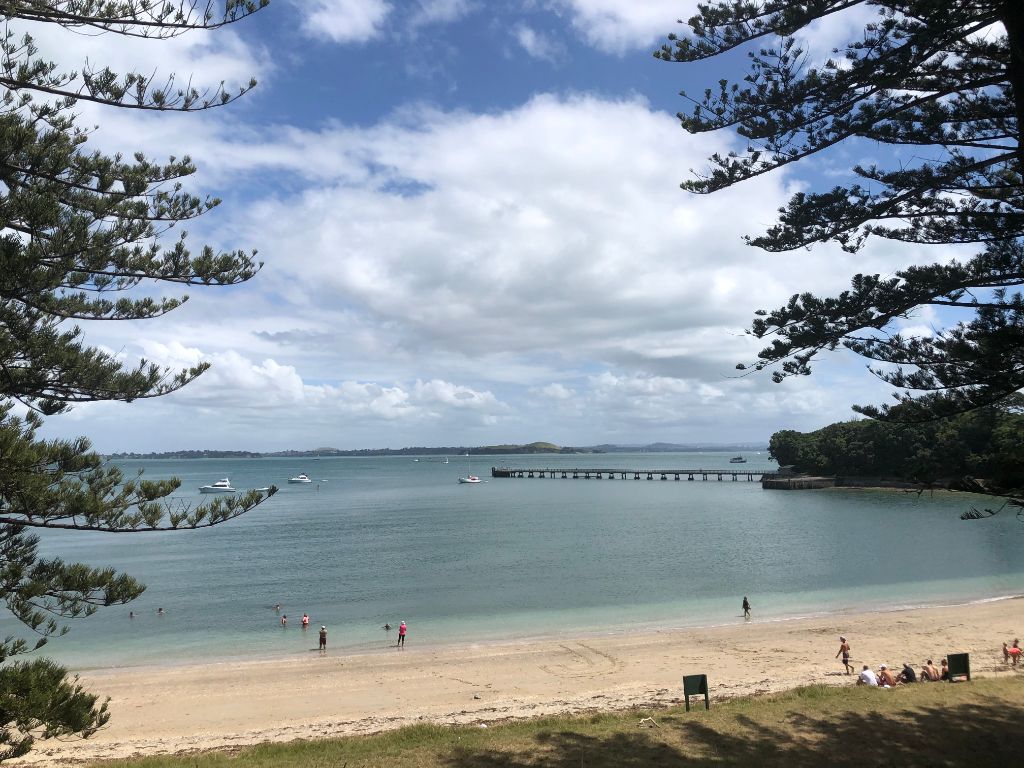
Narrow down the destinations
There are A LOT of stunning locations around New Zealand that deserve your attention.
You can explore majestic parks, mountains, lakes, beaches, urban centres, and well-known landmarks.
However, because New Zealand’s primary draw is its nature, you might need to drive around quite a bit or backtrack to get everything on your list.
The famous quote by Ralph Waldo Emerson, “life is a journey and not a destination”, applies perfectly to a road trip around New Zealand.
Often times the best experience is simply driving and taking in the surrounding landscape.
For the North Island, here are a few places worth looking into:
- Cape Reigna lighthouse (Northland)
- Ninety Mile Beach (Northland)
- Russel (Northland)
- Tutukaka Coast (Northland)
- Waiheke Island (Auckland)
- Rangitoto Island (Auckland)
- Piha Beach (Auckland)
- Cathedral Cove (Coromandel)
- Hot Water Beach (Coromandel)
- Pinnacles Walk (Coromandel)
- Waitomo Caves (Waikato)
- Lake Waikaremoana Track (Hawks Bay)
- Matamata & Hobbiton Movie Set (Waikato)
- Lake Rotorua (Rotorua)
- Mount Maunganui (Bay of Plenty)
- Tongariro National Park (Ruapehu)
- Wellington Te Papa Museum
- Wellington Cable Car
- Lake Taupo (Taupo)
Cape Egmont - Lighthouse (Taranaki)
Mount - Taranaki/Egmont (Taranaki)
- Greytown
- Cape Kidnappers (Hawks Bay)
- Art Deco/Napier (Hawks Bay)
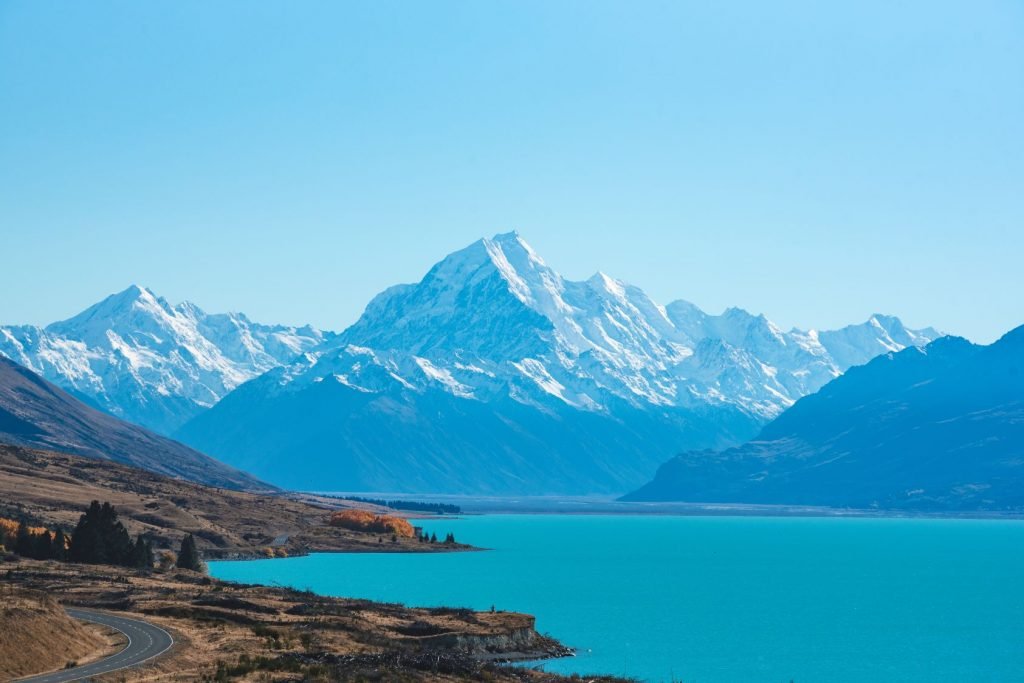
Now for the South Island solo road trip destinations to check out:
- Crown Range (Otago)
Cardrona (Otago) - Glenorchy (Otago)
- Lake Wakatipu (Otago)
- Arrowtown (Otago)
- The Catlins (Otago/Southland)
- Larnach Castle (Otago)
- Milford Sound (Fiordland)
- Doubtful Sound(Fiordland)
- Kepler Track (Fiordland)
- Stewart Island – Rakiura (Southland)
- Slope Point (Southland)
- Nugget Point Lighthouse (Southland)
- Crown Range (Otago)
- Cardrona (Otago)
- Glenorchy (Otago)
- Lake Wakatipu (Otago)
- Arrowtown (Otago)
- The Catlins (Otago/Southland)
- Larnach Castle (Otago)
- Milford Sound (Fiordland)
- Doubtful Sound (Fiordland)
- Kepler Track (Fiordland)
- Stewart Island -Rakiura (Southland)
- Slope Point (Southland)
- Nugget Point Lighthouse (Southland)
And these are not even half of them!
This is where Google my Maps or an app like Campermate can come in handy.
Just add the locations to your saved list as you go and then you will have a visual of the places and a way to keep track of what you have seen so far in each area and what you still want to visit.
Decide on where you will sleep
Accommodation will be one of the biggest costs of your solo road trip.
Since you will be by yourself, there will be no one to share the cost with and private rooms or hotels will significantly increase your expenses.
You still have plenty of options for affordable accommodation options, though, and we will take a closer look at them.
Camping
Camping is one of my favourite activities and is a very popular choice for travellers in New Zealand. A good starting point is to download Campermate and check out some of the options available to get a better idea.
You will have three options when it comes to camping in New Zealand.
- Campgrounds and holiday parks
- DOC campsites
- Freedom Camping
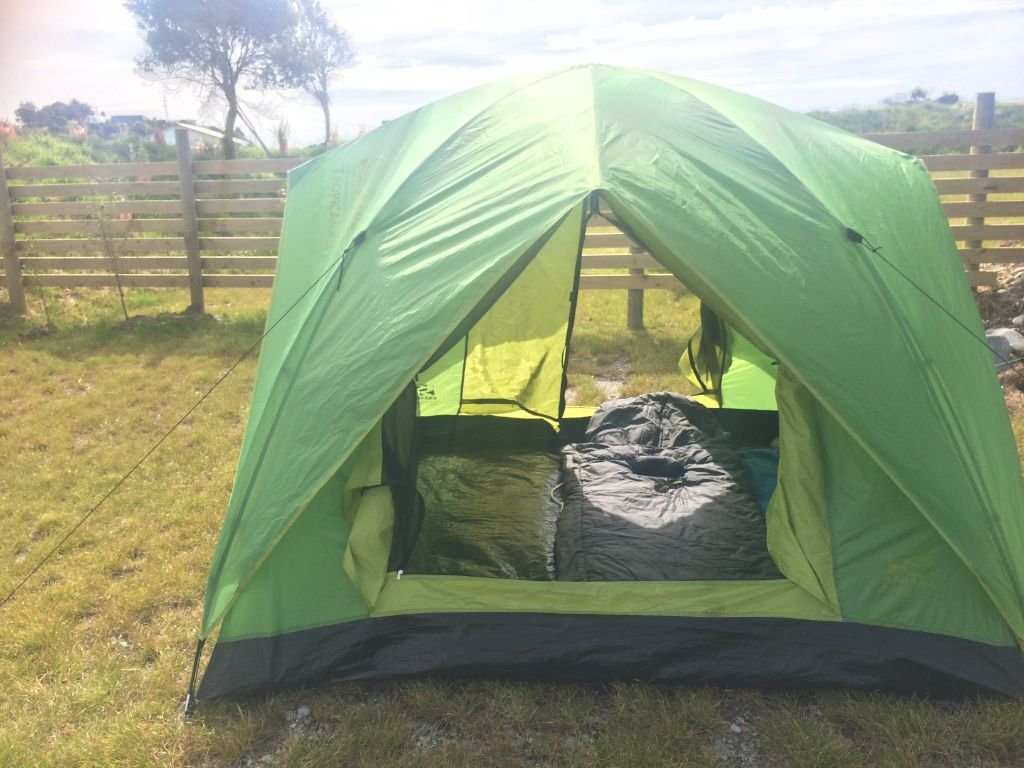
Campgrounds
Campgrounds are best for people with little to no experience and often come with plenty of facilities to make your life easier. You won’t have to worry about buying as much gear and will have access to toilets, a shower and kitchen.
For solo tent campers the cost ranges between 15-30 NZ dollars per day.
Doc Campsites
The Department of Conservation has more than 250 public campsites around the country. Now that is a lot of options! Whatsmore, DOC campsites are located in some of the most beautiful and remote parts of the country, allowing you to explore deeply and connect to the natural landscape around you for an authentic experience.
There are of course pros and cons with DOC campsites but the biggest advantage for solo road trip campers on a budget is the price!
You can find more than 65 campsites around the country that you can access for $0 dollars and the rest range in price from $5-$15NZ per night.
For this price range, the facilities are obviously very basic but price and location factor is unbeatable.
Freedom camping or "free" camping
New Zealand used to be a freedom campers haven but after an inconsiderate number of travellers started treating the country as one big public toilet, the laws became stritcter.
Freedom Camping is still possible, and there are designated spots for all types of travellers. However, in my experience, most of them are for self-contained vehicles only. That means that if you don’t have the self-containment certification sticker, it is a no-go for you.
If you are not going to be using a self-contained vehicle make sure to plan ahead and book in advance. Especially during peak travel season it might make it harder to find something suitable. Wellington is a well-known tricky spot for freedom campers or those that don’t have self-contained vehicles. You might need to drive further out from the city for a better chance.
**I have seen people bypass this by purchasing a car with a sticker that doesn’t meet the standards. Don’t be that person! Just follow the rules and camp where it is allowed. New Zealand might be a friendly country but we like to play with the rules and there are hefty fines when you get found.
Sleeping in a converter car
Can you sleep in your car in New Zealand? Well, yes and no.
For starters, sleeping in your car is legal and encouraged if it is too dangerous to drive. Whether you are sleep deprived or the road conditions are dangerous. But that doesn’t mean you are allowed to camp there, cook, poo in the bushes behind your car, or generally occupy the area in any visible way other than you existing within your car.
All other “car sleeping” should be done within designated camping spots as mentioned above, like campgrounds and doc campsites.
Sleeping in a converted car instead of tenting has become quite popular in New Zealand but you will still need to take into consideration the cost of the DOC campsites. In addition to more than 60 FREE campsites around the country, you also find options for as little as $5.
Most of the really affordable campsites do not have a camp warden and operate an honesty box system where you simply drive in, fill out your details, and put the money in the envelope.
I have needed to sleep in my car a few times while solo road tripping and it was always out of necessity rather than a choice. A couple of times I had to wake up early the next day to start a hiking trail and the weather forecast was for heavy rain throughout the night.
In that scenario, it was the campsite owner that had advised me to sleep in my car to make my life easier the next morning when I would have to pack wet gear in the dark.
Hostels
Hostels are very popular in New Zealand and not just for international visitors or backpackers. For the uninitiated, hostels are shared accommodation units, ranging from 6 to 26 (or more) beds per room. You can request female-only or mixed dorms and there are also different levels of “bathroom sharing”.
Hostels are an enticing choice for travellers on a budget because they can be a great value for money. In addition to a bed, proper bathroom, and kitchen facilities, the best hostels are entertainment hubs, where young (or young at heart) travellers will gather over movie nights, board games, and the hostel bar, to share stories and make plans for things to do around the city.
WWOOFing
Do you have a bit more time to spare during your road trip? Maybe you are looking for an alternative and educational travel experience at the same time? How does learning about sustainable agriculture sound?
WOOFing which stands for Willing Workers on Organic Farms was what I used for my first solo road trip around New Zealand.
This was to overcome the fact that I had neither a car for a road trip nor the gear for camping. The way it works is you sign up for an annual membership ($40 NZ at the time of writing) and get access to a database of hosts that are interested in hosting you.
After setting up your profile so people know who you are and what you are after, you contact them and communicate directly with them in regards to how long you will stay, what your duties will be and what they offer in exchange. The rule of thumb is 3-5 hours of work
You can browse by location, and can also find more information about your future hosts, the hours of work they are after, what they offer in exchange, and the type of work they need from you.
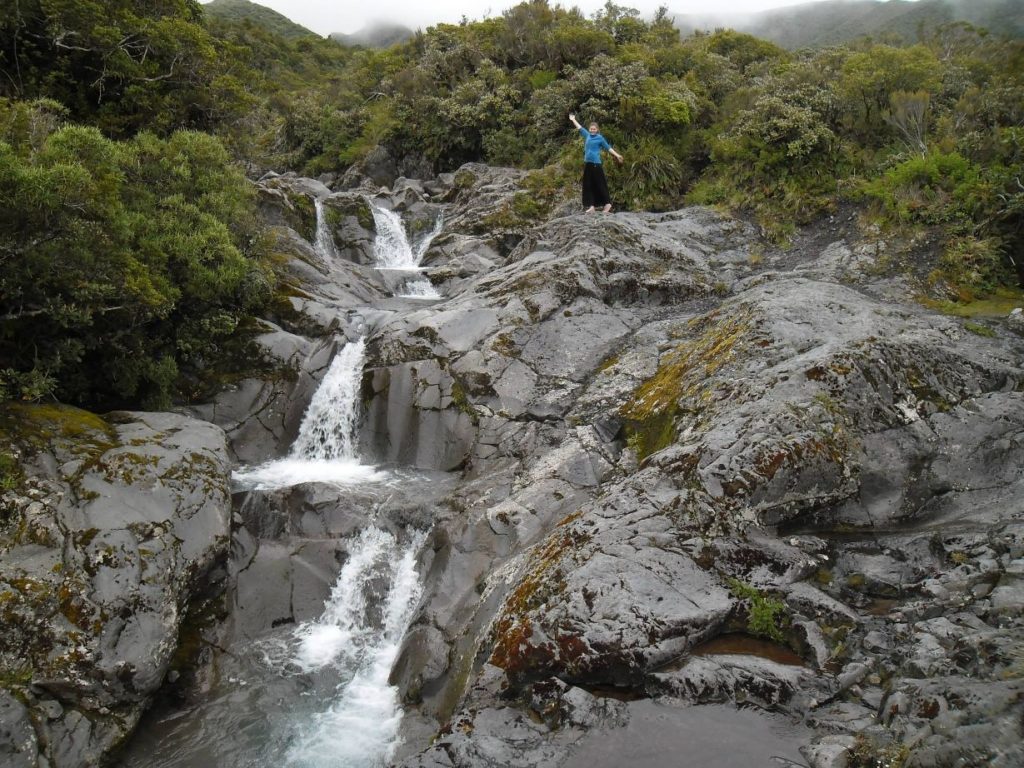
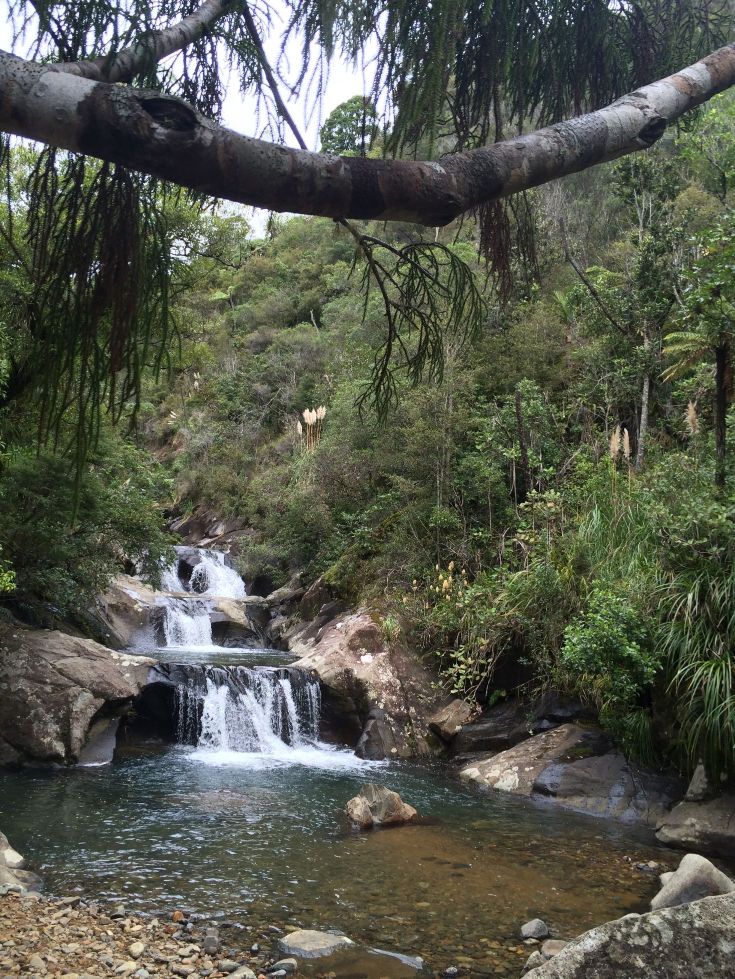
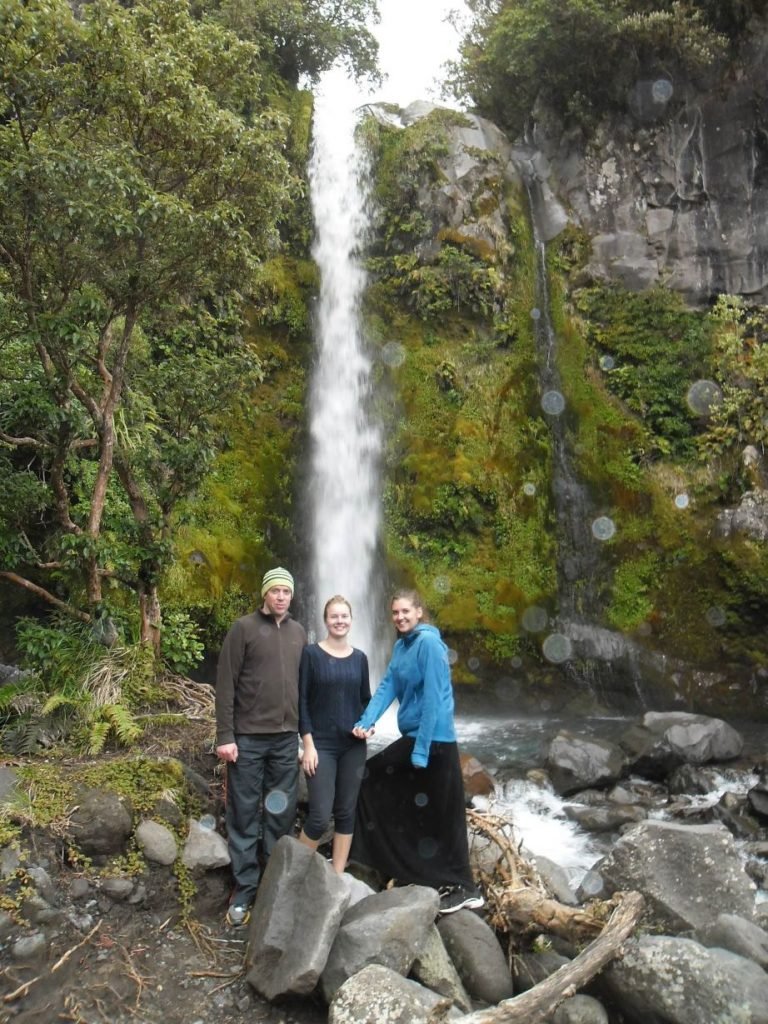
Activities for a roadtrip in New Zealand
You have a mode of transport and have decided where to sleep. You have a budget for food, gas, and accommodation.
Now what about the really cool activities that you always wanted to do?
Things like skydiving in Taupo, bungee jumping in Queenstown or blackwater rafting in Waitomo?
Why are the “I have to do this” activities a separate category from everything else?
Because when you stay on the road for a long period of time, days start to blend and you can easily miss your chance if you don’t plan ahead. With all the logistics of driving, finding your next spot to camp, or stay in and taking in all the landscape, it is normal to forget a few things.

Tips to staying safe on a solo road trip
Safety is always my number one concern when planning a trip, regardless of whether it is a solo road trip in New Zealand or a 2-day escape in Paris with some friends.
You don’t have to travel far to get into a compromising situation and you should practice basic safety precautions whether you are at home or the other side of the world.
However, a solo road trip might pose a few more challenges.
Car Safety
- Insurance and coverage
Paperwork, insurance in case of breakdown or theft, and all that basic stuff. Just make sure they are in order!
- Car check-up
If you are using your own car, it is time to head to the mechanic. You don’t want to be stranded in the middle of the country with an engine problem that could have been prevented.
Things to keep in mind when planning a road trip in New Zealand
- Don’t carry all your money in one place
Accidents happen. Your car could be broken into or you end up misplacing something important. Of course you don’t want your bank card to have to be replaced but that at least is less costly than loosing a stack of cash. New Zealand in general is one of the most card-friendly places you can visit and you can pay for everything including a 0.50 cent apple with your EFTPOS card.
- Copies of all your documents
We all know we should have multiple copies of our most important documents! But do we always follow this advice? No. Make sure to email copies of your passport, bank information, ID card and insurance policy to yourself so you can access it from everywhere in case you need it.
- Know your limits
A solo road trip, especially if it is your very first one, is a journey into your limits. You will test your abilities and your tolerances. You might discover new things you love and things you hate. If you feel like something is putting your safety or wellbeing at risk, don’t push it! For example, driving in the dark is not ideal if you have never driven on the right side of the road before.
- Sharing too much info
Meeting new people on the road is one of the best experiences you can have. Even if you think that you are not a social person or worry about making friends, new acquaintances become best friends very fast and quite unexpectedly. New friendships are forged over drinks at the pub and exploration hikes, camping mishaps and moments when you are truly lost and need to ask for directions. Even so, it is important to remember that not everyone has your best interests at heart. If you sense someone is asking too much information about where you are going next or what your plans are, protect yourself and change your plans!
- Don’t pick up hitchhikers
New Zealand used to be one of the few places in the world where locals and international visitors alike recommended hitchhiking as a legit mode of transportation, especially in the South Island. People are very much still doing so, however, I would not recommend picking up hitchhikers as a solo road-tripper. At the very least use common sense and make sure someone always knows where you are and what you are doing.
ESSENTIAL INFORMATION
Must Know When Visiting New Zealand
- Emergency: Dial 111 for all emergencies.
- Language: Both English and Māori are official languages in New Zealand. Samoan, Northern Chinese and Hindi are also widely spoken. Common phrases to learn are “Kia ora” (Hi – informal greeting), “Aotearoa” (Māori name for New Zealand), “Mōrena”, (Good morning), “Whānau”, (Family).
- Water: Yes, it is perfectly safe to drink tap water in New Zealand.
- Driving: Left-hand side, international driving permit recommended. Book your rental car with Discover Cars for the best rates and comparisons across all major and local companies.
- Accommodation: Booking.com for the most options on hotels, apartments and hostels. Free cancellation in a lot of places and no need to pre-pay. Great for their rewards points system.
- Geography: New Zealand has two main islands (North and South) and a number of smaller islands including Steward Island at the bottom of the South Island.
- Activities: From cultural sights to day trips, food tours and city guides, use Get Your Guide.
- Domestic Airlines: The main airlines for air travel are Air New Zealand (check out their safety videos) and Jetstar.
- Taxi: You will be able to download apps like Uber, Ola and Cabify among others, to order taxi rides.
- Culture: It is not uncommon for people to walk barefoot in certain settings in New Zealand. The summer season is popular for festivals, roadtrips and of course, a good opportunity to see a rugby game.

